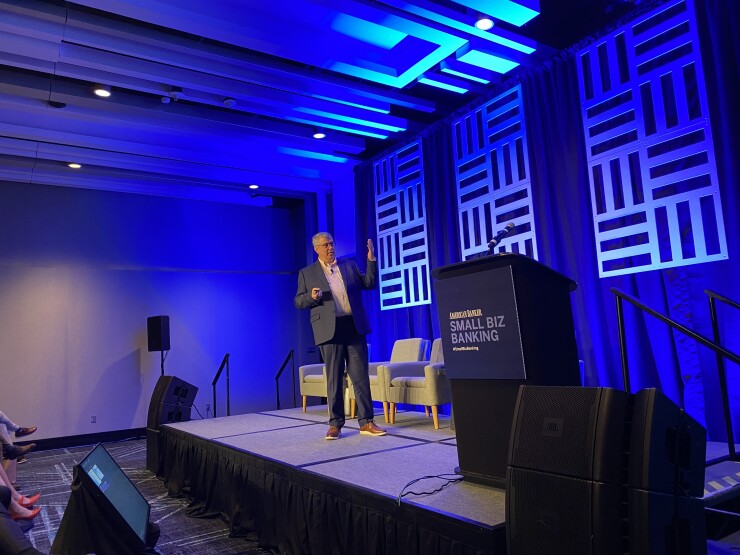NASHVILLE – Bankers' attitude towards small companies have a big problem: their banks often don't think their customers are as important as retail clients. But that's the wrong way to look at it, according to Brian Haney, senior vice president of retail strategy and transformation at Dallas-based Comerica.
Although most banks think of retail as the machine that creates profits, that view overlooks the ways in which small businesses can turn into valuable customers across the bank's divisions, he said. The small-business owner is just a person with the same banking needs as any other — but with extra potential for a lasting relationship with a bank that can make life easier, said Haney, who has worked on small-business banking for 17 years and now holds a retail role.
First, bankers have to convince their own executives of
"Every single business client is also a retail client who has kids, has a spouse, has family, possibly has wealth," said Haney, speaking at American Banker's
Next, they face a bigger difficulty: persuading small-business owners that their bank is better than all the others. "If you don't have a compelling value proposition for the small business clients, then why is that client banking with you?" Haney asked.
Two years ago, the regional bank, which has $86 billion in assets, set out to redo the way it approached small-business clients. By "focusing on small business first" in the retail unit, the project overall has yielded results, he said, with participating branches reporting 12% productivity growth as of August 2023 compared to the prior year.
With the "Retail Reimagined" initiative, as Haney explained it, the bank tried to accomplish five goals: change the way customers used bank branches; change customer and banker behavior; cover more small businesses; offer more unique experiences to customers; and make processes more efficient to save bankers time.
Haney, a Canadian banker who came to Comerica after holding executive roles at JPMorgan Chase and Fifth Third Bank, framed this program as a way to build small-business banking into a more important part of the bank's financial engine.
Part of this shift was to train more bankers to work with small-business clients, focusing on how they can listen to what the client is saying and identify which problem needs a solution, rather than offering a product, Haney said. "The client gives a problem statement and the banker goes to product right away." Regular people don't know or care what a bank product is; if a business owner asks for help paying her suppliers faster, she's not likely to feel heard if her banker immediately suggests ACH payments (which can take several days) or wires (which are faster but more costly).
Comerica also surveyed its small-business clients to see how exactly the bank could help them address business gaps. The answer was a list of requests that had little to do with banking, but instead focused on dollars to spend on advertising, access to customers, tools for productivity, discounts and market research.
As a way of building trust with these business owners, Comerica tried giving them access to benefits like advertising at Comerica-sponsored sports stadiums, as well as tickets to games that the clients could use to cultivate their own relationships. This proved popular with clients, Haney said. "Double thumbs up with huge success."
One unmet need the bank identified was industrial-volume document shredding. Adding shredding as a service brought customers, who stopped by branches to deposit thousands of pounds of paper into drop boxes. "Who would have thought that shred bins would yield a measurable amount of customers?"
Another element of the project involved underused space in branches. Comerica launched a pilot program in its home market, the Dallas area, last spring to offer co-working space in 12 branches to small business clients. The idea was to help solve some of the problems these business owners have, while presenting Comerica as the answer — whether or not the issues were specifically banking-related.
Since then, more than 1,500 people have registered to use the coworking centers, which include shared and private spaces. "Every one of those clients is in your banking center, talking with your bankers, and bankers set them up or greet them, and what a way to build trust," Haney said.
This fall, one customer who had been using the coworking space for a few weeks asked if he could use the branch's community room to host a networking event for other small businesses he wanted to get to know better. At the event, the customer decided to plug Comerica's small-business services, and of the dozen businesses in the room at the time, eight of them began banking with Comerica, Haney said.







